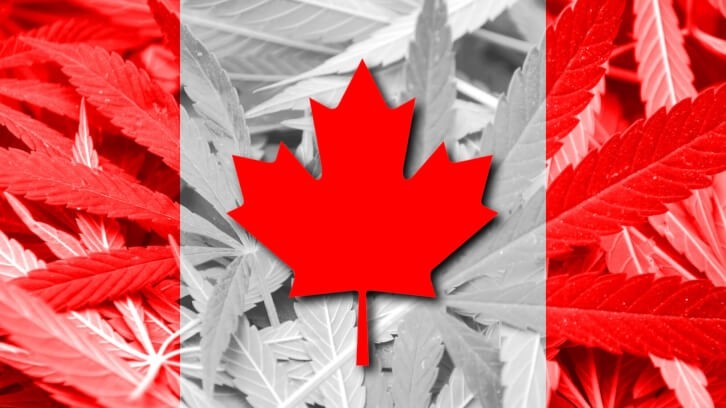Guest Article
Ex-Health Canada NHP DG: ‘Cannabis is Canada’s New Wild West’

Gibson previously held multiple senior positions within Health Canada and served as DG of NNHPD for over three years. He’s also held senior positions with Consumer Health Products Canada and the Canadian Health Food Association, and so is uniquely qualified to discuss the positives and negatives of the Canadian regulatory system.
In this open letter, he outlines the lessons the US should learn from Canada’s efforts to create a regulatory framework for CBD/cannabis.
----------------------------
Dear Americans,
Canada and the USA have many things in common when it comes to cannabis, cannabidiol (CBD), and dietary supplements. There is also one important difference. That is, Canada’s legalization of recreational cannabis and recreational CBD at a national level. North of your border we may be blazing trails, but we don’t know where we’re going.
Our commonalities begin with national passions that surround how we respect each other’s individual health decisions. Passions that have consistently manifested themselves in the regulation of cannabis, dietary supplements and natural health products (what the Canadian government calls dietary supplements).
These passions are the source of many rights and freedom debates, a variety of which are taking place in Canada and the USA right now. Triggering another such debate, given regulatory frameworks exist to manage CBD access, makes the shared timing of discussions in our countries particularly interesting. The Food and Drug Administration (FDA) has concluded that existing regulatory frameworks for dietary supplements are not appropriate for CBD while bi-partisan congressional support suggests otherwise.1,2 Canada’s department of health is stalling their decision over the use of existing natural health product laws to regulate CBD, while peppering Canadians with cannabis consultations. 3
Recognition of the medicinal properties of cannabis (including CBD) was first driven by a compassion for life that led to medicinal cannabis programs across the USA. In 2001, Canada’s charter of rights and freedoms contributed to a court decision that led the way for national medicinal cannabis. 4 Our shared passions are also what drove a history of dietary supplement (food) and natural health product (drug) law making. These laws have foundations in a respect for the health decisions of the individual and our freedom to access natural substances from the world around us.5,6
Regardless if you regulate dietary supplements as food or as drugs, the USA and Canada have the authority to take action against concerns in our markets as well as legal tools to compel evidence in support of statements made on labels.7, 8 These are good regulatory functions. Regulatory functions on which research is driven and respect for patient directed care has been established. We each also have a self-imposed federal barrier to using these existing regulatory systems in order to normalize CBD access. We should not forget the passions and history behind these laws. We should not attempt to redefine the latest examples of products that fall under them.
Look north to appreciate the pitfalls of a nation attempting to redefine a medicine and dietary supplements as something else.
From 2001 to 2018, the only legal way to access cannabis (and CBD) in Canada was under the authority of a medical doctor or nurse practitioner. In 2018, that changed and we made a choice. We chose which sector would be our model for national access to a former medicine with narcotic and non-narcotic properties. Our choice was between the recreational substance sector and the wellness sector. One is associated with causing disease within our healthcare system and the other is legally linked to clinical benefit8 in our healthcare system as well as support for health professionals, academic research, health charities and international health organizations. It isn’t enough to say we chose poorly. Canada’s government soiled a perfectly good saddle before getting it on the horse. Once Canada legalized recreational cannabis in 2018 it effectively became the most wildly regulated ‘non-prescription’ medicine ever. This has led to an array of consequences on national health indicators, policy, research, and access to medicines.
This choice wasn’t accidental. The Canadian Medical Association has consistently advocated for an end to medicinal cannabis in favor of ‘one-system’ (recreational-only).9 With this in mind, our federal government intentionally undermined the use of our existing medical access to cannabis by labelling medical cannabis identically to recreational products and making medical product forms available for recreational use through a national retail network modelled off alcohol and tobacco.
This retail network includes online sales and home delivery without the need for health professionals and narcotic distribution rules. Rules that Canada maintained for identical products sold as medicinal cannabis.10 That is, in Canada we actively direct people with medical conditions who are using or seeking information about medicinal cannabis into a retail network managed by recreational drug ‘experts’, colloquially known as ‘budtenders’11. This kind of narrow-minded thinking marginalizes the health status of patients and their personal initiative to achieve better health.
It gets worse. The Canadian federal government created a profit (not just tax) revenue stream for our state-level governments from a smokable narcotic. This has unknown implications for those very governments to seek reparations from industry for injury caused by a new wave of smoking behaviors. We allowed those same state-level governments to adopt ‘bad actor’ behaviors, turning a blind eye to health claims and hidden combinations with other supplement/medical ingredients such as melatonin.12
The impact on our healthcare system is significant. The federal government found that 14% of Canadians aged 16 years and older indicate that they use cannabis for medical purposes. Provincial and territorial estimates range from 7% to 19%.13 Put simply, millions of Canadians (will admit in a government survey they) are taking cannabis as medicine. The vast majority (78%) are specifically using recreational cannabis as medicine (legally or illegally obtained).13 What’s more, over 50% of these Canadians report decreasing their use of other medications as a result.13
Our government as well as our respective medical professionals also know that public access to a medicine can hinder research.14 To quote the FDA “patients may not want to enroll in a trial with a control or placebo arm if an effective therapy is already available on the market.”15 In Canada, a patient may not want to enroll in a trial if they can otherwise access CBD through a ‘budtender’, or a website managed by our state-level governments with home delivery services. Our government even made it a priority to know more about how we use recreational cannabis for our health than how we use any other legally available non-prescription medicine natural or otherwise.16
Compartmentalized thinking in Canada has led to nonsensical outcomes. Outcomes that appear less to do with protecting public health and generating research and more with overt efforts to simplify bureaucratic decision making and avoid accountability for, and recognition of, patient directed care. Canada’s once world leading health policy approaches have become a sad rodeo of bureaucrats attempting to resolve interconnected public health and regulatory issues in isolation from one another.
It is obvious that our federal government must stop pretending that access to cannabis hasn’t already occurred in order to afford themselves make-believe exercises in risk management. This ignorance fuels presumptions that prescription drug approvals are the only way to incent reputable scientific research. This ignorance is driving the Canadian government to grow a recreational drug industry over one that measurably supports our healthcare system.
America, please learn from our lessons.
I believe we would do well to recognize that existing regulatory systems were built based on rich histories of respect for individual freedoms and the health decisions we all must face during our lives. The concerns that surround CBD represent an opportunity to test and build on regulatory systems that appreciate this respect.
The bottom line for cannabis in Canada is that we let a horse out of the barn. One I believe could be harnessed by, and leveraged to modernize, existing regulatory approaches. Or it will drag us like an unconscious cowboy until a serious bump in the road wakes us up.
References
1. Food and Drug Administration Concludes that food and supplement regulatory frameworks not appropriate for CBD. https://www.fda.gov/news-events/press-announcements/fda-concludes-existing-regulatory-frameworks-foods-and-supplements-are-not-appropriate-cannabidiol
2. Bi-partisan congressional support for regulating CBD as a dietary supplement https://www.nutraingredients-usa.com/Article/2023/03/20/Bipartisan-house-bills-reintroduced-to-regulate-CBD-in-food-dietary-supplements#
3. Consultation and advisory committee regarding cannabidiol https://www.canada.ca/en/health-canada/programs/notice-non-prescription-health-products-containing-cannabidiol.html Cannabis Act consultation https://www.canada.ca/en/health-canada/programs/engaging-cannabis-legalization-regulation-canada-taking-stock-progress.html Note that many distinct consultations have taken place regarding criminal records, growing at home, research and more – connections/coordination between consultations are not clear. Industry reaction to multiple consultations https://cannabis-council.ca/hc-consultations
4. Ontario court decision https://www.ontariocourts.ca/decisions/2000/july/parker.htm
5. Dietary supplements history: https://www.crnusa.org/regulation-legislation/fda-ftc-regulations/dietary-supplement-health-education-act-dshea & https://www.ncbi.nlm.nih.gov/books/NBK216048/ “… legislative action that protects the right of access of consumers to safe dietary supplements is necessary to promote wellness” (DSHEA, P.L. 103-417, § 2 [1994]; OIG, 2001)”
6. A new vision Natural Health Products report from the Standing Committee on Health https://www.ourcommons.ca/DocumentViewer/en/36-1/HEAL/report-2/page-15 (terms of reference).
7. Dietary Supplement Health and Education Act https://www.congress.gov/bill/103rd-congress/senate-bill/784
8. Natural Health Product Regulations https://laws-lois.justice.gc.ca/eng/regulations/sor-2003-196/
9. Canadian Medical Association Positions:
Senate submission https://policybase.cma.ca/media/BriefPDF/BR2018-10.pdf
Maintain same tax rates for medical and recreational https://policybase.cma.ca/media/BriefPDF/BR2018-06.pdf
Proposed approach to cannabis ‘one system’ (recreational): https://www.cma.ca/sites/default/files/pdf/News/proposed-approach-regulation-cannabis-e.pdf
10. Medicinal cannabis regulations https://laws-lois.justice.gc.ca/eng/regulations/SOR-2018-144/page-28.html#h-849868
11. Budtenders https://cannabis-council.ca/images/Budtender-Survey-Highlights.pdf
12. Example (there are others) https://dabcannabisstore.com/shop/noon-night-nightcaps-30-caps/
13. Canada Cannabis Survey (by Canada’s Federal Department of Statistics) https://www.canada.ca/en/health-canada/services/drugs-medication/cannabis/research-data/canadian-cannabis-survey-2021-summary.html
14. NIH research barriers to patient recruitment https://www.ncbi.nlm.nih.gov/books/NBK92104/
15.FDA patient recruitment challenges for conditional approvals (apply to all products): https://www.fda.gov/about-fda/oncology-center-excellence/project-confirm
16. Cannabis use without a doctor’s intervention is the only statistic the federal department of statistics collects regarding use of any drug without prescription.
















